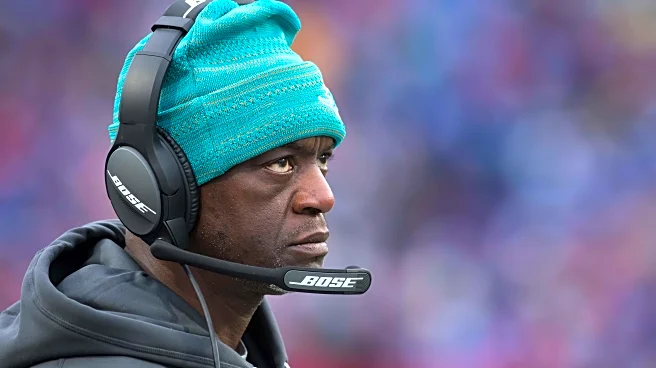What's Happening?
Dexcom, a leading manufacturer of continuous glucose monitors (CGMs), is facing criticism from users of its latest model, the G7, due to reported inaccuracies in glucose readings. Patients and caregivers
have expressed concerns over discrepancies between the G7's readings and traditional fingerstick tests, which have led to confusion and potential physical danger. Some users have reported sharp highs or plummeting lows that do not match their actual blood sugar levels, causing fear and uncertainty. Despite these issues, Dexcom maintains confidence in the performance and accuracy of its devices, offering replacements for sensors confirmed as product failures. The FDA has issued a warning letter to Dexcom after discovering that the company modified materials used in the G7 sensors without formal premarket clearance, leading to multiple consumer class actions against the company.
Why It's Important?
The reported inaccuracies in Dexcom's G7 glucose monitor have significant implications for individuals with Type 1 diabetes who rely on these devices for real-time glucose tracking. Accurate readings are crucial for managing insulin levels and preventing dangerous health events. The discrepancies could lead to incorrect insulin dosing, posing serious health risks. The FDA's involvement and subsequent legal actions highlight the importance of regulatory compliance and transparency in medical device manufacturing. The situation underscores the need for reliable technology in healthcare, as well as the potential consequences of failing to meet safety standards. Patients, especially young children, are at risk, and the trust in Dexcom's products may be compromised, affecting its market position and consumer confidence.
What's Next?
Dexcom is preparing to release its next-generation sensor, which promises improved accuracy and a longer wear time. The company is also working to resolve the issues raised by the FDA and address consumer concerns. Legal proceedings may continue as affected users seek compensation and accountability. The outcome of these actions could influence Dexcom's future operations and product development strategies. Stakeholders, including healthcare providers and patients, will be closely monitoring the company's response and any improvements in product reliability. The situation may prompt broader discussions on the regulation and oversight of medical devices, potentially leading to stricter standards and testing requirements.
Beyond the Headlines
The controversy surrounding Dexcom's G7 glucose monitor raises ethical questions about corporate responsibility and transparency in the healthcare industry. The reliance on CGMs for diabetes management highlights the critical role of technology in patient safety and the ethical obligation of companies to ensure their products are safe and effective. The situation may lead to increased scrutiny of medical device manufacturers and their compliance with regulatory standards. It also emphasizes the importance of patient advocacy and the power of social media in bringing attention to consumer issues. Long-term, this could drive changes in industry practices and enhance patient protection.









